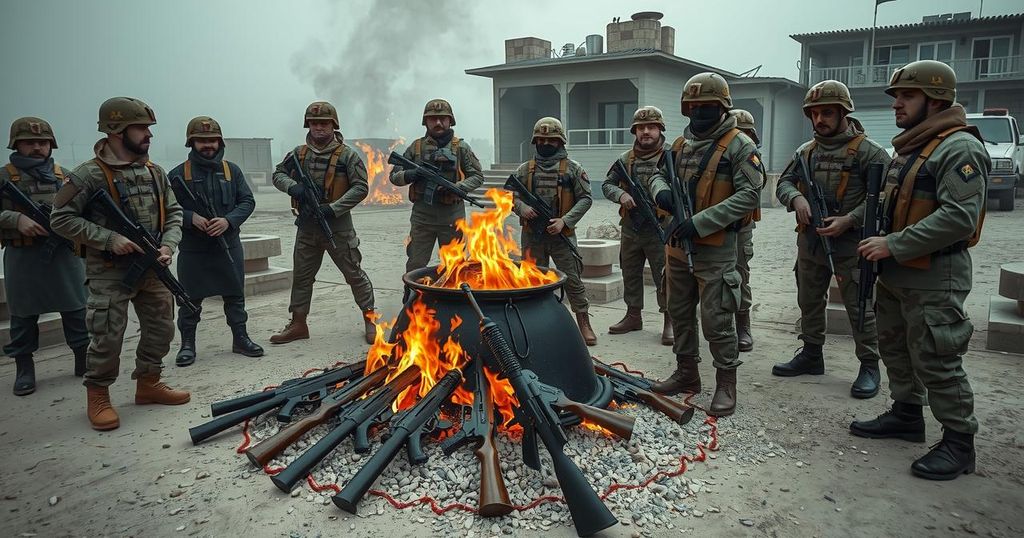What to Know About the Latest Effort to End Turkey’s 40-Year Kurdish Conflict

- Kurdish fighters marked a peace gesture by disarming.
- Abdullah Ocalan urged the PKK to disband recently.
- Devlet Bahceli proposed parole for Ocalan under new conditions.
- Past attempts for peace between Turkey and the PKK have failed.
- The current initiative comes amidst significant regional changes.
Ceremonial Disarmament by Kurdish Fighters in Iraq
In a significant development, thirty Kurdish fighters took part in a ceremonial disarmament process in northern Iraq on Friday, marking an important step towards potentially ending a conflict that has lasted for over four decades. This event saw members of the Kurdistan Workers’ Party, also known as the PKK, burn their weapons in a cauldron, which symbolized their commitment to peace. The recent actions come after Abdullah Ocalan, the PKK’s imprisoned leader, urged members to disband and lay down arms as part of a renewed peace effort with Turkey, echoing such calls in a video message sent just this week.
Understanding the Conflict and Its Key Players
The PKK has fought against Turkey since 1984, originally seeking to establish an independent Kurdish state but later shifting its goals towards gaining autonomy and rights for Kurds within Turkey. This long-standing conflict, which also includes violence that spilled over into Iraq and Syria, has claimed tens of thousands of lives and led to the PKK being labeled a terrorist organization by Turkey, the United States, and the EU. Abdullah Ocalan, a former student of political science, founded the PKK in 1978 and has remained a pivotal figure even while imprisoned since 1999.
New Opportunities Amid Old Challenges
Recently, Turkish nationalist politician Devlet Bahceli has indicated that a possible path to parole for Ocalan could exist if he renounces violence and the PKK reorganizes. This is a notable turnaround for Bahceli, who has a history of opposing any concessions related to Kurdish rights. To facilitate this peace process, Ocalan reiterated his call for disarmament in February, which led the PKK to announce a unilateral ceasefire in March, paving the way for their recent announcement to disarm. Yet, it’s still unclear what gains the Kurdish groups might receive in exchange and whether splinter groups within the PKK could trigger further violence.
Challenges of Previous Peace Efforts
Historically, numerous attempts to establish peace between Turkey and the PKK have failed. Notable negotiations occurred from 2009 to 2011, but they ended without any fruitful agreement. The most recent attempt, which ran between 2013 and 2015, saw some improvements in rights for Kurds, including Kurdish-language broadcasts, collapsed amidst a resurgence of violence. Since then, oppression of pro-Kurdish activists by Turkey has escalated, resulting in thousands being imprisoned, including former pro-Kurdish political party leader Selahattin Demirtas.
Peace Talks in a Changing Regional Landscape
This latest round of peace talks arrives against a backdrop of shifting dynamics in the broader Middle East, with Turkey and the Kurds both in search of stability amid regional upheavals. Factors like changes in Syria’s governance, a decline in the Hezbollah movement in Lebanon, and the ongoing conflict in Gaza are all contributing to a new regional context. Meanwhile, there are signs that Turkish and Kurdish interests might intersect, particularly around discussions of security and political integration as the U.S. backs negotiations with Syrian factions.
Expectations for the Future and Implications
Experts like Hamish Kinnear from Verisk Maplecroft suggest that the PKK’s recent steps towards disarmament are happening because the group’s strength has been waning due to military defeats. While Ocalan’s willingness to engage in peace talks may be a strategic retreat from armed confrontation, it also raises questions about whether Kurdish rights can be meaningfully pursued within a framework that many see as designed to consolidate Erdogan’s power. As Bahceli calls for a new constitution, it’s evident that bridging the gap between Turkish governance and Kurdish autonomy remains a complex and contentious affair, demonstrating how deeply intertwined the issues of peace and power in Turkey are.
Turkey’s conflict with the PKK is entering a new phase as recent events show both sides searching for a resolution to a long-standing discord. The disarmament of PKK members is a significant gesture, though historical failures in peace processes raise skepticism. As regional dynamics shift, the stakes for both the Turkish government and Kurdish groups are evolving, and the outcomes of these peace talks could reshape not only Turkey but the broader Middle East landscape as well.







